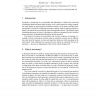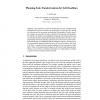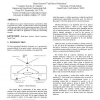ATAL
2000
Springer
14 years 3 months ago
2000
Springer
ATAL
2000
Springer
14 years 3 months ago
2000
Springer
Abstract. This paper is concerned with the problem of how effective social interaction arises from individual social action and mind. The need to study the individual social mind s...
ATAL
2000
Springer
14 years 3 months ago
2000
Springer
Agents often have preference models that are more complicated than minimizing the expected execution cost. In this paper, we study how they should act in the presence of uncertaint...
ATAL
2000
Springer
14 years 3 months ago
2000
Springer
A long and lasting problem in agent research has been to close the gap between agent logics and agent programming frameworks. The main reason for this problem of establishing a li...
ATAL
2000
Springer
14 years 3 months ago
2000
Springer
We outline how an agent’s shared autonomy considerations affect its interaction in a team. A unified model of acting and speaking will be presented that includes teaming and aut...
ATAL
2000
Springer
14 years 3 months ago
2000
Springer
In this paper, we describe a framework to program open societies of concurrently operating agents. The agents maintain a subjective theory about their environment and interact with...
ATAL
2000
Springer
14 years 3 months ago
2000
Springer
Abstract. Recent research has provided methods for coordinating the individually formed concurrent hierarchical plans (CHiPs) of a group of agents in a shared environment. A reason...
ATAL
2000
Springer
14 years 3 months ago
2000
Springer
ATAL
2000
Springer
14 years 3 months ago
2000
Springer
This chapter addresses the problem of producing and maintaining progress in agent design. New architectures often hold important insights into the problems of designing intelligenc...
ATAL
2000
Springer
14 years 3 months ago
2000
Springer



